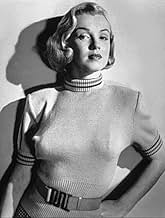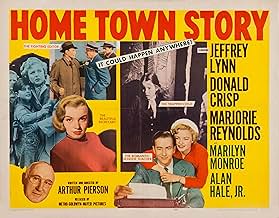Após fracassar na reeleição, o político Blake Washburn volta para casa e se torna editor do jornal local. Ao perceber a influência do jornal sobre o público, ele o utiliza para atrair potenc... Ler tudoApós fracassar na reeleição, o político Blake Washburn volta para casa e se torna editor do jornal local. Ao perceber a influência do jornal sobre o público, ele o utiliza para atrair potenciais eleitores para a próxima eleição.Após fracassar na reeleição, o político Blake Washburn volta para casa e se torna editor do jornal local. Ao perceber a influência do jornal sobre o público, ele o utiliza para atrair potenciais eleitores para a próxima eleição.
- Katie Washburn
- (as Melinda Plowman)
- Hospital Nurse
- (não creditado)
- Jimmy
- (não creditado)
- Don
- (não creditado)
Avaliações em destaque
Allen Hale Jr. is great as the reporter and former WWII Sea-Bee. And I love the character actress who plays the Society Reporter at the newspaper. And, of course, Marjery Reynolds had a great career on early television, shortly after this film.
But the best performance - great despite the fact that it is the vehicle to please the "anti Communist" / Black-list fear of 1951, is that of Donald Crisp: an incredible actor!!
The movie starred Jeffrey Lynn as Blake Washburn - a one term state senator who's defeated for re-election and can't let it go. In fact he's the poster boy for sore losers, ready to pick fights with anybody who brings his defeat up, and convinced that the people were tricked into voting for his opponent. Frankly, he was a thoroughly unlikable character. Returning to his hometown, he uses his new position as editor of the family-run newspaper to criticize the man who beat him and to take on a variety of crusades, most notably against excess corporate profits. In that sense, the movie perhaps had some potential to provide a degree of social analysis, except that there was always question as to whether Washburn really cared about these issues, or whether he was simply using the paper as a platform to launch another election bid. In the end, the movie actually becomes a celebration of the system, as Washburn learns why profits are necessary, and how a company's profits benefit us all.
I found this most interesting for the very early look at Monroe, as well as for a look at a not bad piece of work from a young Alan Hale, Jr., who I know best as the Skipper from "Gilligan's Island." One thing really made me curious - how could Lynn play the brother of young Katie, played by Melinda Plowman, who got a few years as a bit player out of an acting career? Lynn would have been 42 when this was made, Plowman about 10. The family relationship was not at all believable. 4/10
The supporting cast almost makes it worth seeing by itself. How often do you see the combination of Marilyn Monroe, Donald Crisp, and Alan Hale, Jr. in the same movie? Monroe appears in several scenes, and although only one gives her any significant screen time, she does get the chance to command some attention. Hale is well-cast as the good-natured sidekick. Crisp's talent and experience keeps the last portion of the movie from coming apart. The lively Marjorie Reynolds is also in the cast, but her character doesn't give her many opportunities to show what she can do.
The story line was overtly designed to accommodate the corporate backers of the movie, and now it is really only of interest as a look at some common perceptions of its day. The last part of the movie did have the potential for some fairly effective melodrama, but parts of it become rather labored, and it is mainly thanks to Crisp's restrained performance that it remains watchable.
Jeffery Lynn is cast as the leading character, and while he has his moments, he does not really have the range to make a routine story like this work effectively. He does not make his character very likable or interesting, and as a result his character's perspective is largely trivialized. That plus the rather routine script make it a largely unmemorable movie, aside from the curiosity factor that it offers.
This unreleased GM inhouse movie was on TV as a late night movie recently (probably because it had two minutes of yet-to-be-a-star Marilyn Monroe in it), it was so awful I had to find out who wrote, directed and produced it. As I said, it was produced by GM - the writer and director was Arthur Pierson. Four years later Pierson would direct "Born In Freedom: The Story of Colonel Drake", a 30 minute movie about the beginning of the oil industry. I had read how US corporations produced a lot of these propaganda films (as well as books etc.) in the 1950's and tried to get them out there before they came upon more subtle and persuasive techniques and not this hard, bang-you-over-the-head with Soviet-style shoddy propaganda. If anything, this movie is an artifact of that happening, and perhaps interesting in that respect.
Você sabia?
- CuriosidadesMarilyn Monroe was often expected to provide her own wardrobe, a common practice in Hollywood at the time. The sweater with the grey body and black sleeves that she wears worn previously in O Faísca (1950) and in the final scene in A Malvada (1950).
- Erros de gravaçãoWhen Blake arrives home, his mother is listening to a radio show that states it is a Saturday afternoon program, but the next morning (which should be Sunday) Katie gets on a bus to go to school.
- Citações
Iris Martin: I always treat men with respect so they do the same to me.
Slim Haskins: Let me know when that works!
- ConexõesFeatured in Vampira and Me (2012)
Principais escolhas
- How long is Home Town Story?Fornecido pela Alexa
Detalhes
- Data de lançamento
- País de origem
- Idioma
- Também conhecido como
- Home Town Story
- Locações de filme
- Empresas de produção
- Consulte mais créditos da empresa na IMDbPro
- Tempo de duração1 hora 1 minuto
- Cor
- Proporção
- 1.37 : 1
Contribua para esta página




































